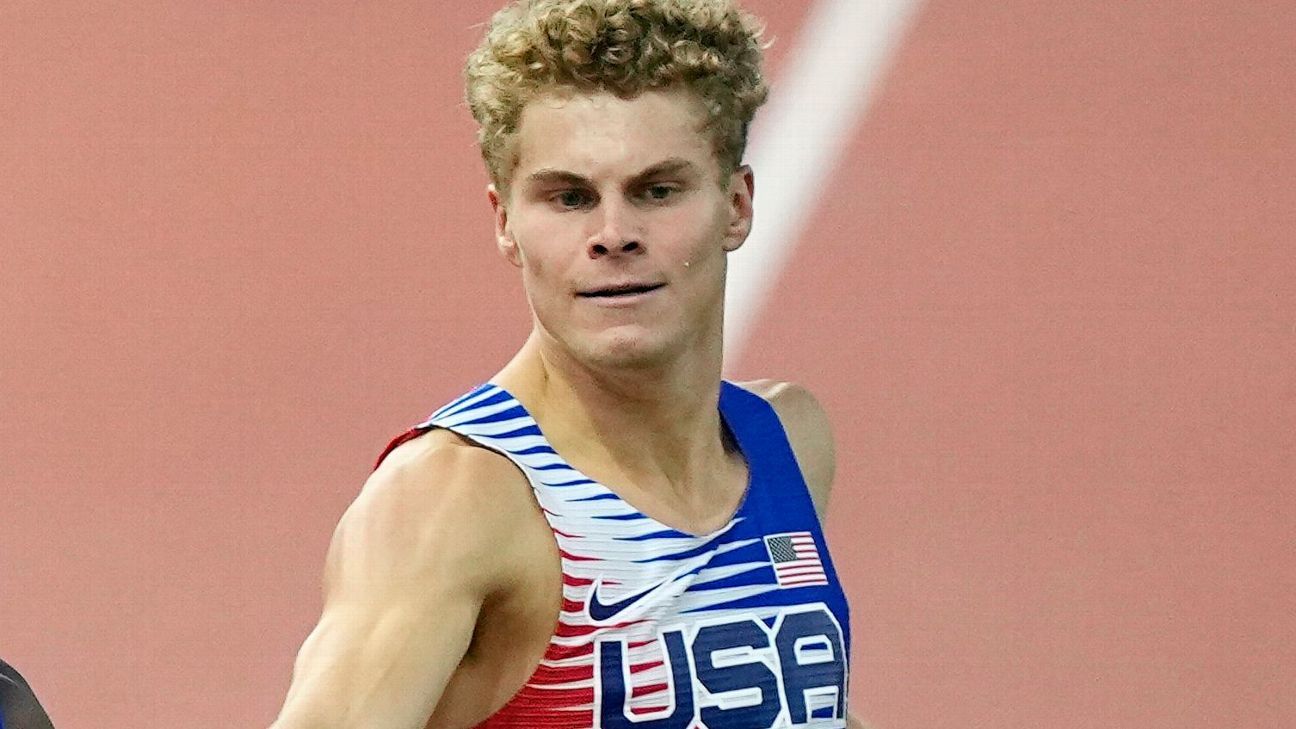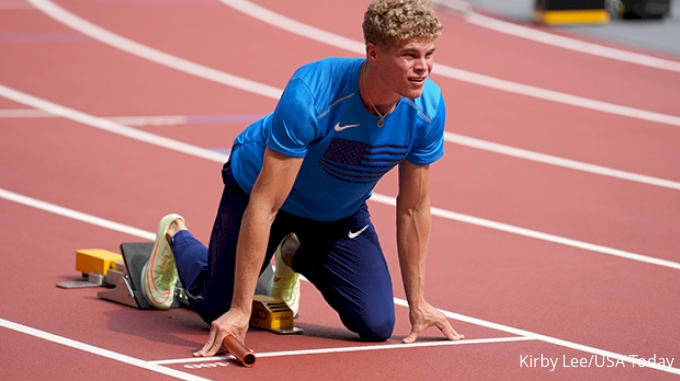Here's a little food for thought on Matthew Boling's season: I know a bunch of people here are disappointed in what he produced or rather did not produce. Very valid considering how talented he is combined with what appears to be a very intense work ethic. I've heard a lot of reasons as to why he has underperformed here including, but not limited to: bad coaching, too many events, bad technique, lack of experience, losing his edge/psychological reasons, and more. Some here have gone as far as to theorize that perhaps he has seen his best days. Well I dont know what's inside Matthew's head, and its ultimately up to him to decide how to interpret his performances and how to respond next year on the psychological side. But on the physical side I would not be too worried about him. Here are some stats taken from the worldathletics.org website for the 2021 season:
1. Matthew Boling: 40 total races including 7 400s and 7 long jump competitions jumping 3 times each
2. Terrance Laird: 37 total races including 1 400
3. Andrew Hudson: 25 total races including 1 300
4. Noah Lyles: 17 total races; 0 400s
5. Kenneth Bednarek: 14 total races; 0 400s
6. Erriyon Knighton: 12 total races including 1 400
If we assumed each 400m race was the equivalent of two races, and three runs down the runway for the long jump counted as say 1.5 races then the above totals adjust to the following:
1. Matthew Boling: 57.5 total races
2. Terrance Laird: 38 total races
3. Andrew Hudson: 25.5 total races
4. Noah Lyles: 17 total races
5. Kenneth Bednarek: 14 total races
6. Erriyon Knighton: 13 total races
Matthew Boling competed 1.31 times more than the three athletes representing the US in the Olympic 200m combined!! I think these numbers show that he was completely overworked. The "muscling" began if I'm not mistaken by the time of the NCAA indoor nationals at which point he had already competed in an adjusted 25 races and over a short period of time. When he became national champion he was already heading down. He needed rest. Lots of the best sprinters start their season with a 400m race - no problem with this at all. But 7 400s and 7 long jump competitions on top of everything else is not going to make you run fast. Sure, week in week out he scored points for Georgia, but I dont know how anyone could have expected him to last the season when looking at the output - and of course he didnt. Muscling occurs in beginning sprinters when they simply havent learned out to run correctly yet. In the case of an experienced sprinter it happens when the athlete feels like they are running slow and so they start to try and force their body to run faster. In other words, Boling knew he wasnt running as fast as he could or should have been. As a comparison look at Terrance Laird. He finished 2nd to Boling at the indoor Nationals and then went on a tare outdoors posting the top times in the world over the next several months. However, by the time NCAA preliminaries and regionals rolled around the 19.8s turned to 19.9s and by the time US nationals came around all he could manage in the final was a 20.15. Laird ran the second most number of races at 38 and he still fatigue through the college season. Boling had 19.5 more adjusted races than Laird!
Boling will be back strong next year I would imagine. Hopefully though he is managed better. He should be treated as a future Olympian and not a College Point Scorer. Had he and Laird been handled better the US might have been represented by both of them and Lyles.
Okay after a quick analysis of this past year, and looking at it as a whole, Boling's season can only be described as a complete **** show from a coaching perspective. ( I wont say disaster because he did win the indoor 200m national title in the world's fastest time and because he came away from the World Championships with two relay Golds.) However, if you are the coach of this athlete you should be embarrassed.
Throughout the year I had been lenient on the coaching staff giving them the benefit of the doubt as we dont know what is going on in their camp, and because adjustments do have to be made during the course of a season sometimes. For example - when it became clear he wasnt going to make the US team in the 100 or 200 they switched to the 400. Given the situation that was a good move, but one that never should have had to have been made in the first place.
In my previous referenced post I noted that in 2021 Boling ran in 40 races and 7 long jumps for a total of 47 competitions, 7 of which were 400m in distance. This was way more than anyone else and I cited this as a reason for him breaking down through the second half of the season. In 2022 the coaches cut this down to 38 and 6 with 7 400s, but still way too much. In 2023 Boling's coaches cut out the Long Jump - good! However, he ran
46 races and 19 of them were of the 400m distance!! (Note: there was one indoor 300m and one 4x400m relay not on the books because World Athletics changed what events they were recognizing and schools hadnt yet adjusted accordingly at the beginning of the season. He also had one sprint medley not reported. I have included these in my calculations.) If you are a 400m runner this is a lot, but for a short sprinter who began the year not planning on running the 400m and not training accordingly this is an absurd amount and creates a huge risk of injury and burnout both physically and mentally. What I find completely inexcusable is that the coaches had two full years with him and gave him seriously heavy loads, and both years he burned out. You then come back in the third year and you actually increase the load and significantly so! Of course he burns out and you have to adjust!
For the comparisons I will look at the best 200m runners in the world for 2023:
1. Noah Lyles - 28 races; 1 400m
2. Erriyon Knighton - 16 races; 1 400m
3. Letsile Tebogo - 18 races; 1 400m
4. Kenny Bednarek - 15 races; 1 400m
Now for comparison lets look at the top NCAA 200m sprinter given that college sprinters are asked to run a lot:
1. Courtney Lindsey - 40 races; 2 400m (This is a tremendous amount of volume and yet way far less than what Boling endured. Lindsey made the final spot of the US World team in the 200m which is a major credit to him. However, at the Worlds he bombed out not being able to run faster than 20.22 in the semi because he too was burned out!!)
In keeping with my previous post and converting 400m races to the equivalency of two races (this probably breaks down for 400m runners as they are adjusted to run the 400m) and then looking at volumes for comparison we get the following for 2023:
1. Noah Lyles - 29 total races
2. Erriyon Knighton - 17 total races
3. Letsile Tebogo - 19 total races
4. Kenny Bednarek - 16 total races
5. Courtney Lindsey - 42 total races
* Matthew Boling - 65 total races!!!
How is he ever supposed to win doing this??? Three years of this is unforgivable.
I want to make one last comparison. Justin Robinson
IS a 400m runner and made the US World Team and also ran collegiately in 2023. Justin ran a total of 40 races with 28 being of 400m distance. This is a lot but he undoubtedly was better prepared and probably did a lot of over-distance training in the fall which Boling would not have done. He too though broke down by Worlds. If we multiplied his 400m races by say a factor of 1.5 instead of 2 then he would have a total race number of 54.
No athlete can keep this up and not get permanently ruined. Nobody, and especially if you're clean. If Boling wants to succeed professionally in track then he needs to leave the college scene, which I think he is doing, and get a real professional sprint coach.






